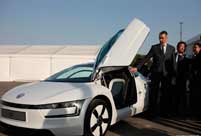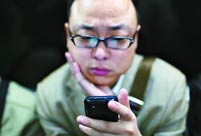 |
| A geneticist scrutinizes saliva samples and analyzes a report about a customer's condition. Photos: Li Hao/GT |
Hurdles in healthcare
Even though a growing number of people are undergoing genetic testing in China, Ye said the age of diagnosing and treating all diseases based on patients' DNA is still a long way away.
"We started in 2008 and didn't pay much attention to this, but the doctors were supportive of this method because it has great clinical effects," she said.
"In 2009, we had about 100 patients [genetically tested]. Last year, we had more than 5,000 patients who chose this method."
Currently, the functions of all genes are not yet known by researchers and doctors, Ye said, adding that some mutations are being used for targeted clinical treatment even though they aren't yet fully understood.
"In the US, there is a test to determine a patient's entire body gene sequence that costs about $1,000. But even if we have the gene sequence, it can't be entirely understood," she said.
In the field of drug development, research is still being carried out.
Even though new genetic markers and targeted medicines are being regularly pioneered, Liu said it is difficult to formulate effective treatments because many drugs and genes aren't related.
Currently, such testing methods aren't subsidized by the government nor private health insurance firms, Liu said.
In 2007, the Ministry of Health published a catalogue on clinical exams that included genetic testing for certain diseases.
For hospitals to run such tests, they also need a TCR lab approved by the ministry.
Zhao noted regulation is loose for genetic testing in China, saying that there isn't sufficient government support to advance its development at a speedier pace.
Despite increasing public demand, genetic testing is still a fringe medical service. But the doctors are optimistic about its future in China.
"Today it's a type of avant-garde medical treatment, but tomorrow it could be the norm," Liu said.


 Fire guts 22-storey Nigeria commercial building in Lagos
Fire guts 22-storey Nigeria commercial building in Lagos U.S. Navy Carrier Strike Group stages military exercises
U.S. Navy Carrier Strike Group stages military exercises Volkswagen showcases new energy vehicles in Beijing
Volkswagen showcases new energy vehicles in Beijing  How should we get married nowadays?
How should we get married nowadays?  Commentary:
Commentary: Jakie Chan sees Rubber Duck off in Beijing
Jakie Chan sees Rubber Duck off in Beijing Hello! Horror Halloween Celebration!
Hello! Horror Halloween Celebration!  The catwalk to the world of fashion
The catwalk to the world of fashion  Cruise trip to Taiwan
Cruise trip to Taiwan  Unveil PLA air force base
Unveil PLA air force base  Say goodbye to tube-like apartment building
Say goodbye to tube-like apartment building Oriental education or western education?
Oriental education or western education? China in autumn: Kingdom of red and golden
China in autumn: Kingdom of red and golden National Geographic Traveler Photo Contest
National Geographic Traveler Photo Contest Chinese screen goddesses from Beijing Film Academy
Chinese screen goddesses from Beijing Film Academy Day|Week|Month